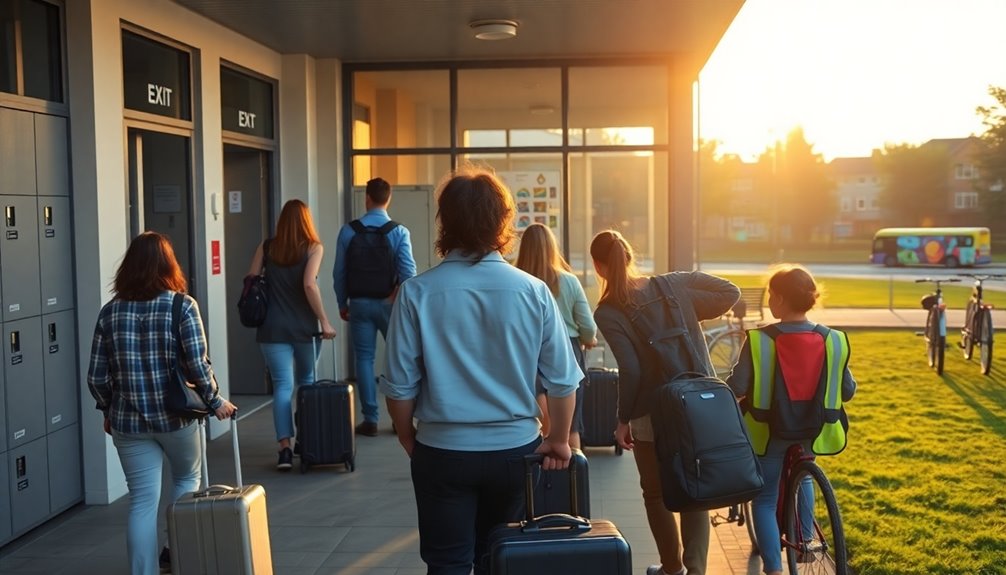
You’ll improve your English fast in Ireland because classes, friendly host families, and real-world activities make you use the language every day. You’ll practice speaking in small lessons, conversation clubs, and cultural outings like music sessions and city tours. Host families offer support and safe supervision, and supervised residences suit older teens who want more independence. With picturesque cities, nature trips, and clear safety measures, you’ll gain confidence — keep going to find practical tips and details.
Highlights
- Immersive everyday English practice with friendly locals accelerates speaking confidence and real-life communication skills.
- Small classes plus cultural activities balance structured learning and natural conversation opportunities.
- Safe, supervised accommodation options (host families or residences) combine independence with guardian support.
- Rich cultural programing—music, céilí, storytelling—and weekend trips deepen language through authentic Irish experiences.
- Clear travel support, visa guidance, and healthcare arrangements offer peace of mind for families and students.
Why Ireland Is Ideal for Teen Language Immersion
Because English is the everyday language and Irish hospitality makes newcomers feel welcome, Ireland offers a natural, low-pressure environment for teens to practice and improve their language skills. You’ll find immersive language immersion opportunities in small classes, homestays, and community activities that let you speak confidently. Cultural exposure is built into outings, music sessions, and local festivals, so you’ll learn slang, etiquette, and storytelling alongside grammar. You can choose programs that balance structured lessons with free time to explore coasts and towns, giving you independence while ensuring safety. This setting helps you grow linguistically and culturally without feeling rushed.
Top Cities for Teen Summer English Programs
You’ll find two standout options for teen programs: Dublin, where vibrant cultural sites, museums, and organized activities keep learners engaged after class. Galway offers a coastal learning experience with a strong arts scene and outdoor excursions that build language through real-life interaction. Choose based on whether you want city energy and structured activities or a smaller, seaside setting with a relaxed, creative vibe.
Dublin: Culture and Activities
When you step into Dublin, you’ll find a compact city where history, lively arts, and friendly locals shape everyday life — perfect for teens wanting an immersive English experience. You’ll explore Dublin history on walking tours, visit Trinity College, and hear storytellers in cozy pubs (daytime youth events available). Arts festivals, street performers, and contemporary galleries keep things fresh, while parks invite relaxed socializing. You’ll practise English ordering diverse Dublin cuisine from markets to cafés, join cooking workshops, or try traditional music nights. Safe transport and youth-focused activities mean you can roam confidently, learn naturally, and enjoy real Irish city life.
Galway: Coastal Learning Experience
Leaving Dublin’s urban buzz behind, head west to Galway for a coastal English experience that blends seaside charm with lively student culture. You’ll practice English in small classes, then explore coastal activities like surfing, kayaking, and lively market conversations that build real-world skills. Walks to Aran Islands and through scenic landscapes sharpen vocabulary and give you freedom to discover local music, food, and friendly accents. Homestays or shared housing let you live language daily while enjoying festivals and street performances. Galway’s relaxed pace suits teens who want immersive study plus outdoor adventure, independence, and genuine cultural exchange.
Student Accommodation Options and Safety Tips

Because where you stay affects both your comfort and how quickly you’ll adjust, it helps to compare the main accommodation types before you arrive: host families for immersive language practice and guardian support, supervised student residences that balance independence with on-site staff, and carefully vetted shared apartments for older teens seeking more freedom. You’ll want clear info on accommodation types and safety measures: curfews, emergency contacts, room checks, and staff ratios. Ask about meal plans, cultural norms, and privacy rules so you can enjoy independence responsibly. Trustworthy providers will share references, insurance details, and straightforward behaviour expectations.
Transportation Essentials for Young Students
When you plan travel to and from your homestay or residence, make sure you know the safe door-to-door transfer options offered by the program so you’re not left traversing unfamiliar streets. You’ll also want clear guidance on using Ireland’s public transport—how to read timetables, buy tickets, and travel respectfully on buses and trains. Before you arrive, confirm the accommodation pick-up procedures, including meeting points, emergency contacts, and any ID required.
Safe Door-To-Door Transfers
Comfort and confidence start at the door: reliable, supervised door-to-door transfers are essential for keeping teens safe and parents reassured during summer English programs in Ireland. You’ll appreciate clear pick-up/drop-off times, vetted drivers, and background-checked escorts who prioritize student safety and respect local customs. Transfers let you explore freely while organizers manage logistics, emergency contacts, and route transparency. You won’t need to navigate unfamiliar roads alone, and guardians get real-time updates for peace of mind. This structured freedom balances independence with protection, so students can enjoy cultural experiences without compromising safety or parental trust.
Public Transport Guidance
After reliable door-to-door transfers get you settled, you’ll also want clear guidance on using Ireland’s public transport to explore independently and safely. You’ll learn the main public transport options—buses, trams, and regional trains—how to buy tickets, and when to seek student discounts. Practical safety guidelines cover staying in groups after dusk, keeping valuables secure, and knowing emergency numbers. Local customs, like queuing and offering seats to older passengers, help you blend in. With straightforward maps, apps, and staff contacts, you’ll feel confident maneuvering through towns and making the most of free time while respecting Irish culture.
Accommodation Pick-Up Procedures
1 clear pick-up plan makes arriving at your accommodation smooth and stress-free: you’ll get exact meeting points, driver/host contact details, vehicle descriptions, and an estimated arrival window so you know who to look for and when. You’ll be briefed on arrival logistics before travel, with contingency instructions for delays and emergency contacts. Drivers respect local customs and safety, and hosts explain baggage help and quiet hours. At student orientation you’ll review rules, meet peers, and learn about local transport options so you can explore independently. This system gives you freedom while keeping practical safeguards in place.
Typical Daily Schedule at Teen English Schools
While mornings usually start with structured language classes to build grammar and speaking confidence, your day at a teen English school in Ireland will mix lessons, activities, and free time so you get steady progress without feeling overwhelmed. You’ll follow a clear Class Structure: focused morning lessons, targeted workshops, and small-group practice that boost confidence. Afternoons are for Daily Activities like conversational clubs, sports, or project work that let you use English naturally and choose how active you want to be. Evenings offer supervised chill time or optional study sessions. This balance helps you learn fast while keeping independence and fun intact.
Cultural Activities and Weekend Excursions
You’ll get guided city sightseeing tours that highlight landmarks, history, and local life so you can practice English in real situations. Expect traditional Irish experiences like music sessions, storytelling, and visits to cultural sites that show how modern Ireland connects with its past. Weekend nature trips to the coast, cliffs, or countryside will give you fresh-air adventures and language practice outside the classroom.
City Sightseeing Tours
Ever wondered how a single hop-on, hop-off bus could give you a perfect starter map of Ireland’s cities? You’ll get quick orientation, learn city history through audio guides, and spot cultural landmarks from a relaxed vantage. Tours let you jump off to wander narrow streets, sample local cafés, or sketch a riverside scene—then rejoin when you’re ready. They’re ideal when you crave independence but want safe structure: clear routes, regular stops, and friendly staff. Use them to plan longer stays or spontaneous detours, and you’ll leave knowing where to return for deeper exploration.
Traditional Irish Experiences
When you want to dive deeper than sightseeing, traditional Irish experiences give you a hands-on way to connect with local life—think céilí dancing, music sessions in cozy pubs, storytelling evenings, and full-day trips to castles, coastal villages, and ancient sites. You’ll join workshops where Irish folklore comes alive through tales and song, taste traditional cuisine like soda bread, stew, and seafood, and learn phrases that make conversations richer. These activities balance guided structure with free moments to explore, so you’ll gain cultural insight, practice English naturally, and return home with memories and friends shaped by authentic local rhythms.
Weekend Nature Trips
Although Ireland’s towns are full of charm, the weekend nature trips are where the landscape teaches as much as the guides do: you’ll hike along rugged coastlines, explore windswept cliffs and hidden coves, and visit national parks where bogs, lakes, and mountains tell stories of geology and folklore. You’ll choose nature hikes that suit your pace — gentle lakeside walks or challenging ridge routes — and join wildlife exploration outings to spot seabirds, seals, and native flora. These trips give you freedom to roam, practice English in real situations, and connect with Irish culture through landscape, story, and sustainable travel.
Visa Requirements and Travel Documents for Teens
If you’re planning a teen summer program in Ireland, you’ll need to confirm the right visa and travel documents well before departure so there are no last‑minute delays; requirements depend on your nationality, the length of stay, and whether guardians or group leaders will accompany you. Check whether you need a teen visa or can travel visa‑free, and apply early if one’s required. Passport validity, parental consent letters, and proof of accommodation or course enrolment are commonly requested. Keep digital and printed copies of travel documents, emergency contacts, and consent forms so you can explore freely and confidently while staying compliant.
Healthcare, Insurance, and Emergency Services
Because healthcare systems and coverage options vary, you’ll want to sort medical care and insurance before you leave so you won’t face surprises if you need treatment. In Ireland you’ll find reliable healthcare services and friendly emergency responders, but you should know what’s covered. Check whether your family plan extends abroad or buy short-term insurance coverage that includes evacuation and prescription access. Carry proof of coverage, a list of medications, and emergency contacts. Know local emergency numbers and how to reach program staff quickly. Doing this lets you explore freely, confident that care and support are in place if needed.
Money Matters: Costs, Banking, and Budgeting

When you’re planning for a teen summer program in Ireland, getting a clear handle on costs, banking, and budgeting will keep surprises to a minimum and let you enjoy the experience. You’ll want to compare course fees, accommodation, meals, transport and pocket money so your plan matches the freedom you crave. Use simple budgeting tips: set daily limits, track spending in an app, and allocate an emergency fund. Explore banking options like travel-friendly debit cards, local student accounts, or prepaid cards to avoid fees. Know exchange rates and ATM charges, and keep receipts for accountability and peace of mind.
Communication: SIM Cards, Wi‑Fi, and Staying Connected
Budgeting for phone access is as important as planning for meals or transport—staying connected helps you navigate, meet up with friends, and keep in touch with family without racking up surprise charges. Choose a local SIM for cheaper data and calls; most providers offer short-term plans perfect for your stay. Free Wi‑Fi’s common in cafés, libraries, and campuses, but don’t rely on it exclusively for maps or emergencies. Consider a liberated phone, a backup power bank, and privacy settings before using social media. Smart choices mean freedom to explore Ireland while maintaining reliable mobile connectivity and peace of mind.
Local Etiquette, School Rules, and Teen Behavior Expectations
While you’ll find Irish people friendly and relaxed, it’s important to show respect for local customs and your school’s rules—doing so makes your stay smoother and safer. You’ll be expected to follow curfews, attend classes, and respect shared spaces; teachers and staff set boundaries to protect everyone. Practice polite teen communication: greet people, listen, and ask questions if unsure. Learn basic local customs like queuing, punctuality for activities, and polite small talk. You’ll have freedom, but balancing independence with respect keeps hosts and classmates comfortable, builds trust, and helps you enjoy your summer fully.
Preparing for Arrival: Packing List and Pre‑Departure Checklist
Because you’ll want to arrive calm and ready, start your packing and pre‑departure checks early so nothing important gets left behind. Pack smart: layering works in Ireland’s changeable weather, so include a waterproof jacket, comfortable shoes, and versatile clothing. Bring charging adapters, any medication, and a small first‑aid kit. Copy travel documents—passport, visa, emergency contacts—and store digital backups separately. Notify your bank and confirm accommodation and arrival times. Learn a few local phrases and respect cultural norms while keeping your independence. A clear packing essentials list and checklist will let you explore freely from day one.
Some Questions Answered
Can Parents Visit or Stay Nearby During the Program?
Yes — you can often visit or stay nearby, and programs welcome parental involvement while respecting student independence. Check program logistics for guest accommodations, visiting hours, and security rules before booking. You’ll find options like nearby hotels, weekday drop-ins, or assigned parent days. Be culturally aware: Irish hosts value politeness and community, so plan low-key visits that support your teen’s freedom while following program guidelines and local customs.
Are There Options for Language Certification or End-Of-Course Reports?
A student earned a Cambridge A2 certificate after taking end‑of‑course exams, proving progress. Yes — you’ll usually get formal language assessments and progress reports; some programs offer internationally recognized certificates (Cambridge, IELTS prep) while others give detailed teacher evaluations and portfolios. You’ll receive clear feedback on reading, writing, listening and speaking, plus recommendations for continued learning, letting you plan future study or travel with confidence and freedom.
What Happens if My Teen Needs Academic Support or Tutoring?
If your teen needs academic support, they’ll get access to academic resources and personalized tutoring tailored to their pace and goals. You can expect flexible one-on-one or small-group sessions, study plans, and progress reports that respect cultural differences and learning styles. Tutors help with grammar, exam prep, or confidence-building so your teen keeps enjoying independence while improving skills. You’ll be kept informed and can request extra sessions as needed.
Are Dietary Restrictions and Cultural Meal Preferences Accommodated?
Yes — and there’s a thoughtful pause before the good part: you’ll be relieved. You’ll find dietary accommodations tailored to allergies, intolerances, and religious needs, with menus that respect cultural meals and personal choices. Staff consult with you, label food clearly, and offer alternatives so your teen can enjoy varied, healthy options. That freedom lets them explore, socialize, and eat confidently while staying safe and respected.
Can Students Participate in Homestay Selection or Roommate Choices?
Yes — you can often influence homestay preferences and roommate compatibility. You’ll state preferences (dietary needs, activities, interests) and sometimes request specific roommates or gender arrangements. Programs try to honor cultural sensitivities and freedom-loving students’ wishes, balancing safety and family fit. While guarantees aren’t always possible, organizers communicate options, consider compatibility, and match you with hosts who respect your lifestyle and help you enjoy an independent, comfortable stay.
Summing Everything Up
You’ve picked a fantastic place to grow — Ireland mixes excellent English learning with safe, friendly towns and unforgettable culture. Pack smart, budget carefully, and follow local customs so you’ll fit right in. Stay connected, know transport options, and pick accommodation that feels secure. You’ll make friends and improve fast if you immerse yourself, keep an open mind, and take every chance to practice — don’t be afraid to leap and grab the opportunity.
